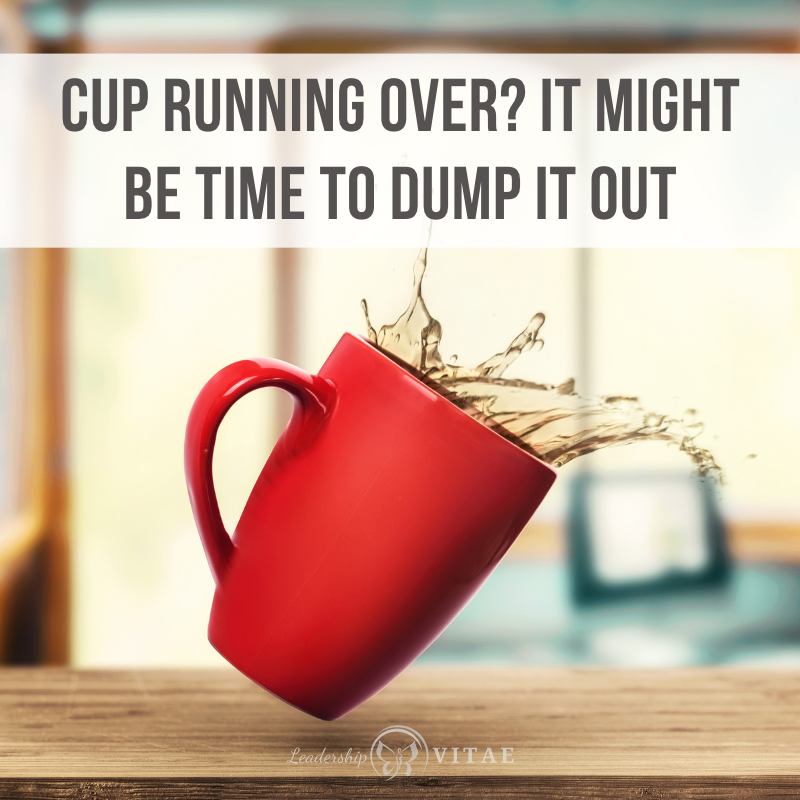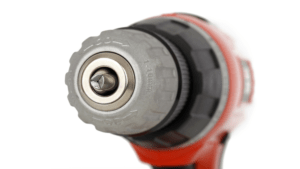
The expression “my cup runneth over” may be one you’re familiar with. I grew up in the church (as a military kid, many of them in fact) and it’s one of the few biblical phrases I still remember. It generally has a positive connotation. The idea is that I have more than enough to meet my needs. When that’s the case, I have something I can give.
In recent years – tied to the self-care movement – the cup analogy has become common. Endless quotes and memes remind us we can’t pour from an empty cup. We must keep our cup replenished if we are to help others or we are trying to give energy we don’t have.
Coming back from my fourth burnout in as many years, I’ve found myself becoming attached to the cup analogy. What goes in the cup? How can I know when it’s too empty or too full? How can I use these insights to anticipate or respond to burnout?
Turns out that for me, a cup running over it’s not a good sign. It’s a sign that I am overwhelmed and need to take action.
The cup of life
Our (symbolic) cup represents all the ways we focus our time, energy, and attention.
Everything we need to do or want to achieve is represented by the water we pour into the cup. If we pour too much water into the cup, it will overflow. Similarly, we become overwhelmed when we take on too many obligations without prioritizing them effectively.
Therefore, managing our priorities is like managing the water we pour into the cup. We must ensure that we don’t pour more water than the cup can hold, or we risk overflowing and becoming stressed and overwhelmed.
Each of us manages our cup differently, but we can all get to the point of overload. How do we become more aware of the water level in our cup and take action before it spills over?
The first step is knowing what we’re putting in it.
Filling our cup
We each have different ideas of how to fill our respective cups. Which activities and interactions to invest or indulge in, whether meaningful, fun, distracting, or elsewise.
When we consider all we want to do or achieve, we can use common categories:
- Work
- Finances
- Health
- Family / Friends / Romantic Relationships
- Personal Growth
- Fun and Recreation
- Volunteering
We may have other buckets that align to our interests and priorities. Personally, as someone who is neurodiverse, I’d add adulting. Trying to get through life each day (eating, showering, dressing, brushing teeth, etc) takes effort, which may be more draining for some of us than others.
That points to a reality that not all activities are equal. For each activity one of us finds as draining, another will be energized. Even the same activity, in different contexts, can take more or less energy. For example, I do enough reading and writing to complete a PhD program and I find it exhilarating. However, the specific type of reading and writing necessary for me to obtain said doctorate is not.
Knowing what goes into our cup and whether it’s energizing or draining is key to understanding how we fill our cup.
Managing to the brim
Each of us not only decides what we fill our cup with, but how full we like to keep it. For some, it may be important to have reserves, so there’s plenty of space left in the cup when the unexpected occurs.
For others, maybe we don’t manage the cup well, and we tend to spill over. Personally, I manage right to the brim. Each day, I am go go go until I hit a wall. At that point, I tend to decompress and then sleep solidly until I start over again the next day. That critical rest gives me space to push again.
When we add or change things in our lives, we may – intentionally or inadvertently – go over the brim. With intention, we can see it coming and choose to take some things out of the cup. In my case, a new job might mean that I need to limit time with friends and not write for a bit. As the job gets easier, I can add them back in. Once it feels routine, I’ve got the space for a new role or another major change.
When we are less aware, that spillover can impact our ability to address everything else. For example, as we are overrun, our sleep may be impacted first. As that impacts our mental and emotional state, our work performance, relationships, and overall health may suffer as well.
What can we do if we find ourselves overrun? Dump out the cup.
Dump it all out
During the summer of 2020, I fell apart. After finding myself on the couch for a week, unsure what happened, I realized I needed help. It took a few months, but I climbed out of the hole.
In that case, I didn’t have a choice. The cup basically fell over and everything spilled out. I barely had energy to get through the workday and spent the rest of my time in a fog. I had to work to right the cup and intentionally add one thing back in at a time.
Since then, I’ve been hyper-aware of my energy levels and what’s on my plate. Yet I still find myself getting to burnout. Fortunately, not nearly as bad as that 2020 episode. How? I intentionally dump out my cup.
Most of us don’t have the luxury of quitting our jobs. However, I will take time off. As a single mother, I also can’t decide not to parent. I try to look ahead to when my son is visiting his dad and create time when I don’t have to be anything to anyone.
During that retreat from the world, I’ll commit to nothing but healthy coping. The only thing I’ll make sure to do is REST. Until I’m rested, nothing else is going in the cup.
Ideally, we wouldn’t get to this place. However, if we anticipate burnout approaching, it might be time to let go of whatever we can from our commitments and focus on ourselves.
Preventing burnout
There’s a lot of information out there on how to prevent burnout. Yet it’s on the rise. I suspect it’s because we are in the age of disruption and there is constant change happening in the world and at work. As a result, it’s happening at home too.
We may not even realize our cup is spilling over until we find ourselves getting snappy and frustrated, not sleeping well, or struggling to focus. We can do our best to dump out our cup and start over once we realize it. But what can we do to prevent getting to that point?
We can prioritize what goes into our cup. Ruthlessly.
- Consider the 80/20 rule. If 80% of our results come from 20% of our efforts, identify the 20% of the activities that produce 80% of our results and focus on those. Unless it energizes us, we should delete, defer, or delegate the rest.
- Set clear intentions. When we know where we’re headed in life/work, we can ensure the things we are doing align. If it doesn’t align, consider it optional.
- Rest and recharge. Make time for mental breaks or decompressing at the end of a hard day. Prioritize sleep, as that’s the last thing we can afford to lose if we want to perform at our best.
Fortunately, my most recent burnout episode only took a few weeks to turn around. I’m back to writing, which I find energizing. Unfortunately, it’s usually the first thing I struggle with when I’m feeling overwhelmed. And isn’t that the way of things? Our best coping mechanisms, like sleep, physical activity, and hobbies tend to be the first we sacrifice when we are overwhelmed. Yet they are the very thing that will likely help us stay healthy.
Getting help
Sometimes, no matter our efforts, we may struggle to right our cup. I have worked with coaches and therapists over the last 4 years as I’ve looked to design my life in a sustainable way. They have been critical support before, during, and after burnout cycles.
If you find yourself struggling, please consider reaching out for help. While I have followed the recommendations in this article, it is not a replacement for working with someone that can help each of us with our unique needs.








